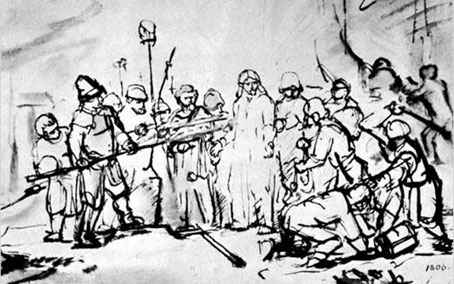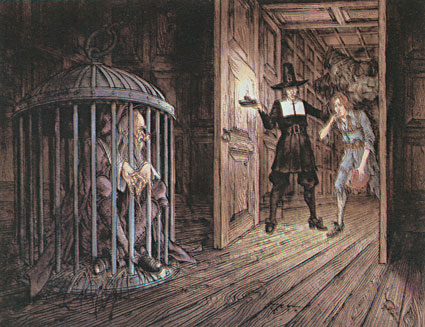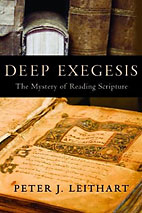Oct
22
2009
or Becoming the Finger of God on the Eject Button
“Immediately, the Spirit drove Him into the wilderness.” —Mark 1:12

NOTE: THIS POST HAS BEEN REMIXED AND INCLUDED IN GOD’S KITCHEN.
You must be logged in to see the rest of this post.
Join now for a year for $15!
Oswald Chambers says:
The first thing to do in examining the power that dominates me is to take hold of the unwelcome fact that I am responsible for being thus dominated. If I am a slave to myself, I am to blame because at a point away back I yielded to myself. Likewise, if I obey God I do so because I have yielded myself to Him.
Continue reading
Comments Off | tags: AD70, Demons, Holiness, James Jordan, Obama, Oswald Chambers, Temptation | posted in Biblical Theology, Christian Life, Quotes, The Last Days
Oct
20
2009
or Submissible Evidence According to Paul

“…it is instructive that when the issue was so decisively drawn with his legalist opponents, Paul, at the climax of his argument, appealed to an allegory to refute the gainsayers of grace…”
Warren Gage writes:
Continue reading
Comments Off | tags: Galatians, Hermeneutics, Paul, Typology, Warren Gage | posted in Biblical Theology, Quotes
Oct
20
2009

or Tearing the Old Adam in Two
Jesus comes to the Pharisees. Who are the Pharisees? They are us. Pharisees are the evangelicals. They are the faithful in Israel.
The Sadducees were the liberals, the zealots were the political activists and the Essenes were the dropouts, and Jesus doesn’t fool with them at all.
Continue reading
4 comments | tags: AD70, James Jordan, Pharisees, Revelation | posted in Biblical Theology, Quotes, The Last Days
Oct
10
2009

The Eccentricity of Religion
by Henry Drummond
“They said, He is beside Himself,”—Mark 3:21
The most pathetic life in the history of the world is the life of the Lord Jesus.
Those who study it find out, every day, a fresh sorrow. Before He came it was already foretold that He would be acquainted with grief, but no imagination has ever conceived the darkness of the reality.
Continue reading
Comments Off | tags: Henry Drummond | posted in Christian Life, Quotes
Oct
7
2009
or OT as Mostly an Accommodation to Ancient Pop-Culture?

The Modern Evangelical Bible Academy, Model 2300X.
In his new book Deep Exegesis, Peter Leithart has a great chapter called “The Text is a Husk: Modern Hermeneutics”. To distill his chapter down to its basic essence, he says that distilling the Scriptures down to their basic essence is not what God intends. The text is not a kernel hidden in a husk that can be discarded. We are not to heave our Bibles down to the threshingfloor. Every word of Scripture has significance.
Leithart presents a fascinating history of this methodology and the philosophies behind its various forms. Then he turns on “the good guys.”
Continue reading
1 comment | tags: Hermeneutics, Peter Leithart | posted in Biblical Theology, Quotes
Oct
5
2009
Exhortation by Mike Lawyer (I think) at Christkirk, 27th September 2009.
 The Bible tells us we were created for God’s glory. Glory means, in a very simple sense, to make one famous. Our job therefore is to make God famous. We do this by praising Him, bragging on Him, telling others of His glorious works in our lives and in the lives of our brothers and sisters in Christ, both now and in history. When others hear about the mighty works of God, they believe our words and put their trust in Him, and He is made more famous than He was before. He gets glory.
The Bible tells us we were created for God’s glory. Glory means, in a very simple sense, to make one famous. Our job therefore is to make God famous. We do this by praising Him, bragging on Him, telling others of His glorious works in our lives and in the lives of our brothers and sisters in Christ, both now and in history. When others hear about the mighty works of God, they believe our words and put their trust in Him, and He is made more famous than He was before. He gets glory.
One of the impediments to our making God famous is when the words of our message don’t match our behaviour. It sends mixed signals to those who are hearing the story. But we believe God’s story is glorious, so why don’t our lives match our story? I believe it is a combination of two very simple things.
Continue reading
Comments Off | tags: Christkirk, Compromise, Prayer, Witness | posted in Christian Life, Quotes
Sep
23
2009
or Suckers for Systems

God chooses certain men to do great works. Their work is duplicated and multiplied in the institutions they found. When these men are gone, those who remain tend to rely on systems. The machine must be maintained for pride’s sake, regardless of whether it is being used by God or not. This violates two basic biblical principles.
Continue reading
Comments Off | tags: Church Growth, Church History, Discipleship, Ecclesiology, James Jordan, Postmillennialism, Watchman Nee | posted in Christian Life, Quotes
Sep
18
2009

I saw in my dream, that the Interpreter took Christian by the hand again, and led him into a very dark room, where there sat a man in an iron cage. Now the man seemed very sad. He sat with his eyes looking down to the ground, and his hands folded together, and he sighed as if his heart would break.
Then said Christian, “Who is this?”
“Talk with him and see,” said the Interpreter.
“What used you to be?” asked Christian.
“I was once a flourishing professor, both in my own eyes, and also in the eyes of others,” answered the man. “I was on my way, as I thought, to the Celestial City and I was confident that I would get there.”
“But what did you do to bring yourself to this condition?” Christian asked.
“I failed to keep watch,” the man replied. “I followed the pleasures of this world, which promised me all manner of delights. But they proved to be an empty bubble. And now I am shut up in this iron cage—a man of despair who can’t get out.”
No further explanations were given. No one said who put him there. But the Interpreter whispered to Christian:
“Bear well in mind what you have seen.” [1]
. . . . . . . . . . . . . . . . . . . . . . . . . . . . . . . . . . . . . . .
Another thought related to the ideas in Behind Closed Doors.
The whole aim of the construction process, whether in sex, foetal development, education, business, art, music, family or state government, is the ultimate revelation of a mature glory. We are given the opportunity to create, and that involves certain God-given freedoms. If the freedoms are abused, what we construct for ourselves is a cage. Lust is a cage. A dysfunctional family or state is a cage. Enforced egalitarian socio-economics is a cage. Undisciplined children are a cage.
Jesus laid down His life for this world, and the freedoms of western culture have been a direct outcome. In its final stages, we have rebelliously inverted each of these freedoms (including the economic ones) and turned both our Christian protection (including our God-given wealth) and Christian mandate into a cage. Ancient Israel did the same. Why does this inversion process seem such a logical path for fallen human nature?
Continue reading
3 comments | tags: Altar of the Abyss, Babel, Biblical worldview, Culture, Dominion Theology, Doug Wilson, Economics, Incense Altar, John Bunyan, Parenting, Politics, Postmillennialism, Solomon, Tabernacle, Worship, Worship as commerce | posted in Christian Life, Quotes
Sep
18
2009
Excerpts from Peter Leithart’s new book, Deep Exegesis: The Mystery of Reading Scripture:
 “My insight, if such it is, into the workings of humour was reinforced and generalised when I watched Shrek, a movie that I now tell my students is a gold mine of hermeneutical insight. All the funny parts of that film assume that the viewer has information the movie does not provide, information from three main sources: nursery rhymes, fairy tales, and popular culture, especially movies…”
“My insight, if such it is, into the workings of humour was reinforced and generalised when I watched Shrek, a movie that I now tell my students is a gold mine of hermeneutical insight. All the funny parts of that film assume that the viewer has information the movie does not provide, information from three main sources: nursery rhymes, fairy tales, and popular culture, especially movies…”
Johannine Jokes
…How does all this apply to our reading of Scripture? Scripture has the same literary properties as the texts we have been examining. Just as Eliot read Dante who read Virgil who read Homer, so Matthew had read Jeremiah, who knew Kings (or wrote it), and the writer of Kings had read the Hexateuch. Let us look at some examples. Let me tell some biblical jokes, again taken from John 9.
Continue reading
Comments Off | tags: Culture, Hermeneutics, John, Joke, Peter Leithart | posted in Biblical Theology, Quotes
Sep
10
2009

But the LORD said to Joshua, “Do not be afraid because of them, for tomorrow about this time I will deliver all of them slain before Israel. You shall hamstring their horses and burn their chariots with fire.” Joshua 11:6
‘Thus says the Lord GOD: “Are [you] he of whom I have spoken in former days by My servants the prophets of Israel, who prophesied for years in those days that I would bring you against them? Ezekiel 38:17
James Jordan’s correlation of Ezekiel 38-39 with the book of Esther makes a great deal of sense.[1] I have found it plays out in many ways, including the structure of the book of Ezekiel. None of the books of the Bible are thrown together haphazardly. They all follow strict literary conventions. The validity of this Esther interpretation is supported by the structure of the book of Ezekiel.
Continue reading
Comments Off | tags: Esther, Ezekiel, Feasts, Haman, Joshua, Translation | posted in Biblical Theology, Quotes, The Restoration Era



































